Still Worldly After All These Years, Dana Howell Retires
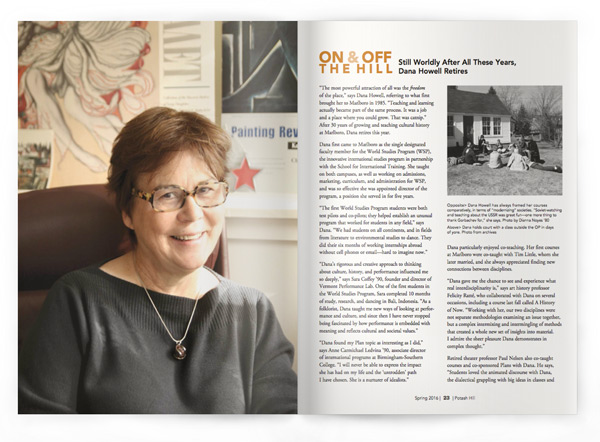
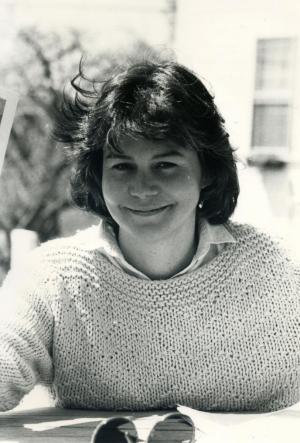
“The most powerful attraction of all was the freedom of the place,” says Dana Howell, referring to what first brought her to Marlboro in 1985. “Teaching and learning actually became part of the same process. It was a job and a place where you could grow. That was catnip.” After 30 years of growing and teaching cultural history at Marlboro, Dana retires this year.
Dana first came to Marlboro as the single designated faculty member for the World Studies Program (WSP), the innovative international studies program in partnership with the School for International Training. She taught on both campuses, as well as working on admissions, marketing, curriculum, and administration for WSP, and was so effective she was appointed director of the program, a position she served in for five years.
“The first World Studies Program students were both test pilots and co-pilots; they helped establish an unusual program that worked for students in any field,” says Dana. “We had students on all continents, and in fields from literature to environmental studies to dance. They did their six months of working internships abroad without cell phones or email—hard to imagine now.”
“Dana’s rigorous and creative approach to thinking about culture, history, and performance influenced me so deeply,” says Sara Coffey ’90, founder and director of Vermont Performance Lab. One of the first students in the World Studies Program, Sara completed 10 months of study, research, and dancing in Bali, Indonesia. “As a folklorist, Dana taught me new ways of looking at performance and culture, and since then I have never stopped being fascinated by how performance is embedded with meaning and reflects cultural and societal values.”
“Dana found my Plan topic as interesting as I did,” says Anne Carmichael Ledvina ’90, associate director of international programs at Birmingham-Southern College. “I will never be able to express the impact she has had on my life and the ‘untrodden’ path I have chosen. She is a nurturer of idealists.” Dana particularly enjoyed co-teaching. Her first courses at Marlboro were co-taught with Tim Little, whom she later married, and she always appreciated finding new connections between disciplines.
“Dana gave me the chance to see and experience what real interdisciplinarity is,” says art history professor Felicity Ratt., who collaborated with Dana on several occasions, including a course last fall called A History of Now. “Working with her, our two disciplines were not separate methodologies examining an issue together, but a complex intermixing and intermingling of methods that created a whole new set of insights into material. I admire the sheer pleasure Dana demonstrates in complex thought.”
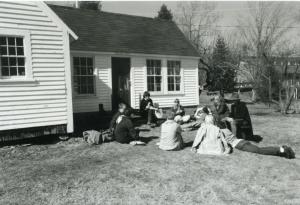
Retired theater professor Paul Nelsen also co-taught courses and co-sponsored Plans with Dana. He says, “Students loved the animated discourse with Dana, the dialectical grappling with big ideas in classes and tutorials. She deeply attached herself to the core idealism of Marlboro and was an inspirational force behind outstanding work of many students.”
Literature professor Geraldine Pittman de Battle says, “Sharing Plans with Dana has meant that I have learned, and been excited by, her knowledge and her imagination. Marlboro is a hard place to get to know, but she knew immediately what a wonderful place it was and spent her entire career here keeping the ideals of Marlboro in countless ways.”
“Working with Dana was a privilege and a pivotal part of my undergraduate education,” says Colby Silver ’12, now in graduate school for international affairs at The New School. “The extent of her knowledge in a wide breadth of topics was always inspiring, and reinforced the value of a self-directed liberal arts education.”
“The thing that drew me to Dana, and the thing I admired most about her, was her way of interacting with her students,” says Amy Frazier ’06, now the film and media librarian at Middlebury College. “She’s plainspoken; you always knew that she’d tell you what she really thought. I know I presented her with some teaching challenges back in my day, but I wouldn’t be the person I am without her influence.”
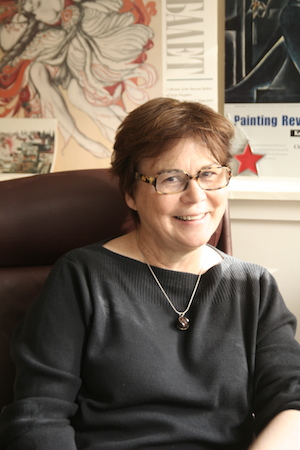
“I’m always surprised by the creativity of students here, and the diversity in this small community,” says Dana, whose international perspective and wide-ranging interests allowed her to work with Plan students on a broad range of topics, from seafaring in Newfoundland to Japanese fashion. “I never know what to expect—they always think of something I haven’t. I have valued the intelligence, independent-mindedness, and irreverent humor of students at Marlboro. I will miss that.”
“Both in class, as well as in the roles of Plan sponsor and friend, Dana has displayed an innovative and inquisitive rigor that I find exhilarating and instrumental,” says one former student, now a graduate student in humanities at University of Chicago. “I continue to reap the benefits of having explored difficult lines of inquiry with her. I very much admire her ability to bring to light increasingly complex networks of cultural connections in contemporary events and thought.”
“I have always been in awe of Dana’s ability to bring together widely disparate ideas in a coherent and meaningful way,” says Kimberly Mills ’89, who went on to get her doctorate and teach anthropology for 10 years. “Dana gave me permission to be myself in the academic world. Her willingness to accept my ideas as both valid and valuable built my confidence as a scholar, and as a person, in ways that no one else has ever matched.”
Starting in 2000, Dana worked with the Open Society Institute (OSI), the international grant-making network now called Open Society Foundations. She led an evaluation team to the first liberal arts college in Russia, then served as chair of an international academic advisory committee. In that capacity she selected and supported projects for democratizing undergraduate teaching in the post-Soviet region, traveling each summer to projects from Kyrgyzstan to Croatia.
“Dana’s passion for teaching captured me, and remains something, I am convinced, that few can do so well,” says Rhett Bowlin ’93, who directed OSI’s International Higher Education Support program for nine years and recruited Dana to work with him. “With Dana I realized that I was empowered to make all kinds of consequentially positive choices in my life, for the rest of my life, including my choice to ask her to work with me.”
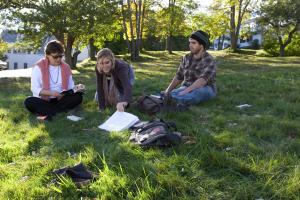
Will Jenkins ’10, who’s working on a doctoral dissertation in history at UC Berkeley, says, “Dana makes education an extended conversation. I genuinely think of my Plan as a product of our conversations over the course of two years, and even casual conversations we had in tutorials have been foundational to my academic trajectory since then. I’ve never met anyone since who treats both her subject and her students with such respect.”
Dana’s plans for retirement are open. Her book The Development of Soviet Folkloristics was reissued last year by Routledge, and she plans to do some more writing. She has the usual list of “finally time for” things, like traveling to Patagonia, learning ancient Greek, and reading War and Peace in Russian.
“For several years, I’ve been focused on the normalization of war, the various presences of war in society, and the extension of war to civilians. So I am most absorbed by that at present. I don’t know how ambitious I’ll be, but I know I won’t be bored.”
